L.G.M.L. v. Noem: A Hearing Diary

On Sept. 10, U.S. District Judge Timothy Kelly held a preliminary injunction hearing in L.G.M.L v. Noem, the lawsuit seeking to block the Trump administration’s plan to summarily remove hundreds of unaccompanied migrant children to Guatemala. Judge Sparkle Sooknanan had previously issued a temporary restraining order preventing the children’s deportation.
During the hearing, Judge Kelly heard argument on the plaintiffs’ requests for a preliminary injunction and certification of a class. The judge has yet to issue a decision on the matter.
Lawfare’s Anna Bower and Roger Parloff covered the hearing as it happened. Read Bower's report by clicking the button below or view her thread on Bluesky here.
Liveblog
COMING UP: The fate of hundreds of unaccompanied minor children hangs in the balance as a federal judge, Tim Kelly, weighs whether to block their summary removal from the United States. At 2 p.m. ET, Kelly will hear argument on the children’s motion to enjoin their deportation. Follow along ⬇️ 🧵
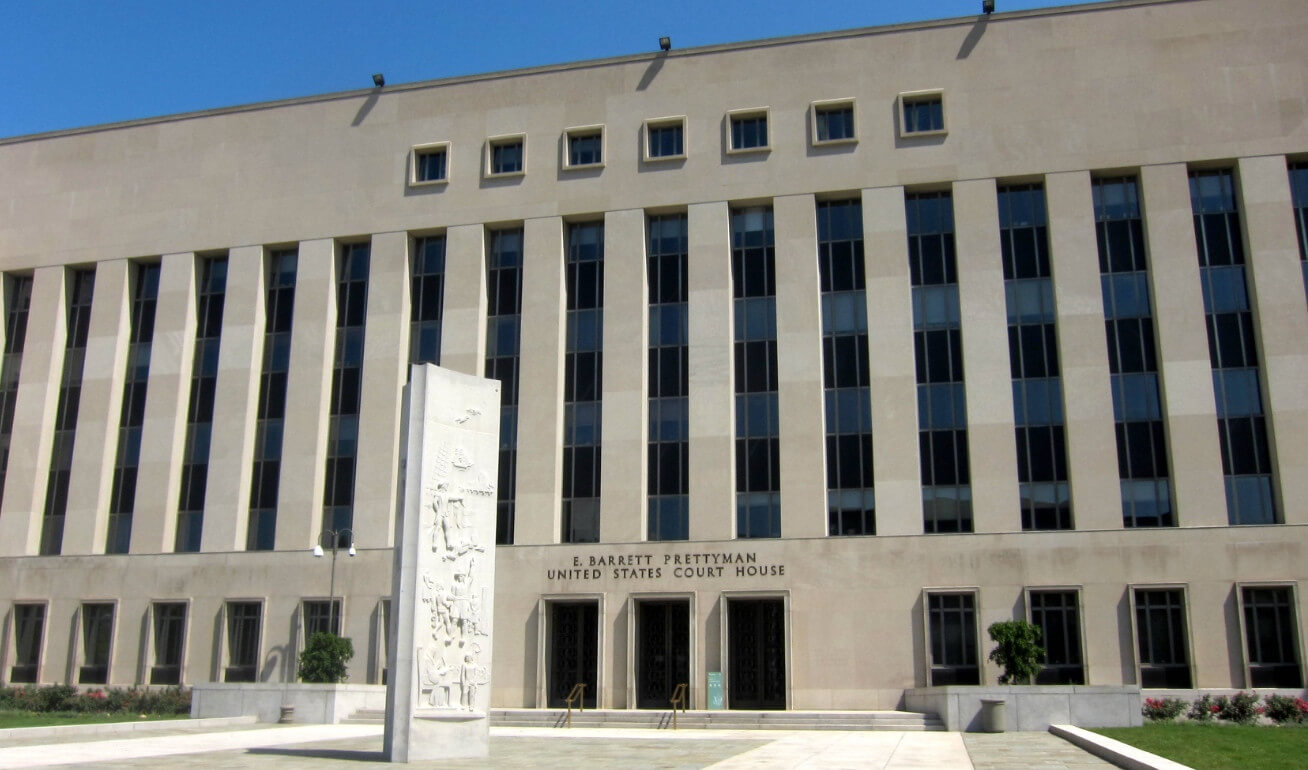
BACKGROUND: In the middle of the night on Labor Day weekend, the Trump administration rounded up dozens of unaccompanied Guatemalan children and put them on airplanes for deportation. That prompted speedy intervention by Judge Sparkle Sooknanan, who temporarily halted their summary removal. 2/
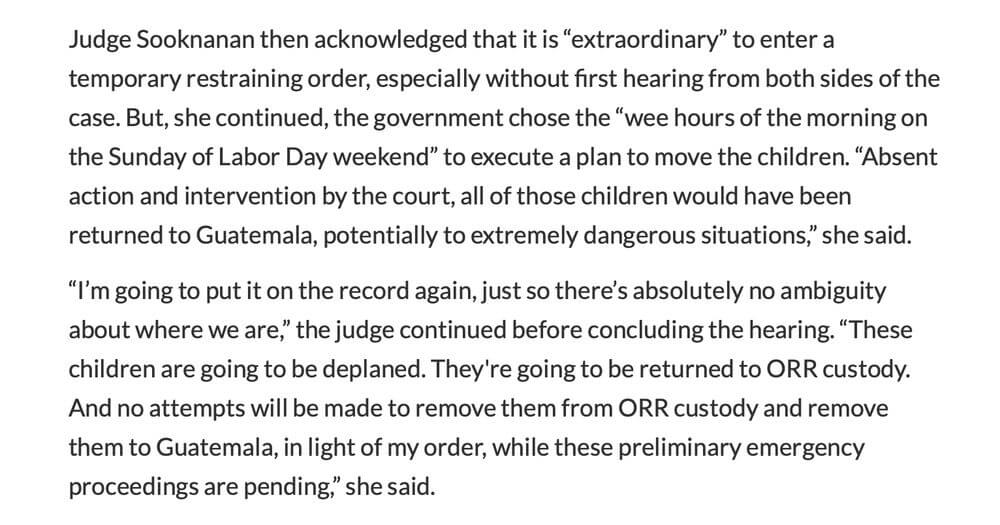
Now a different judge, Tim Kelly, must decide whether to grant longer-term relief while the children litigate their case. Kelly is a Trump appointee. More details in my @lawfare piece: https://www.lawfaremedia.org/article/the-judicial-learning-curve
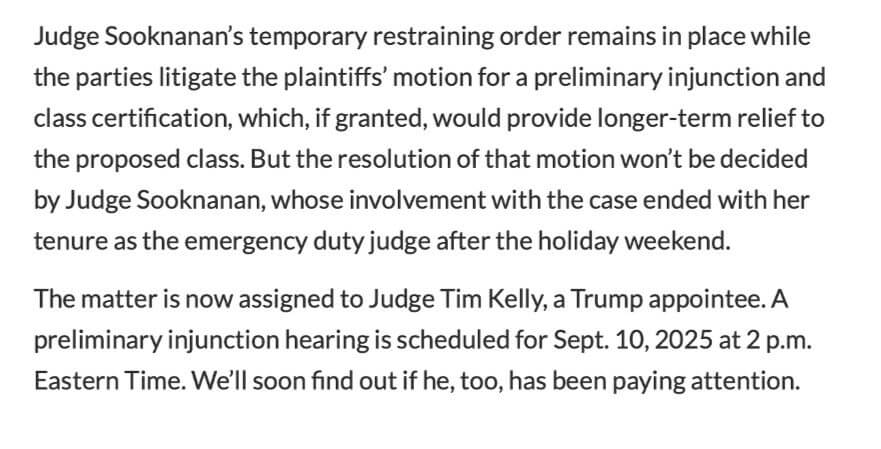
THE LAW: In theory, the law is supposed to protect these children from being whisked out of the country by the government at a moment’s notice. A statute, the TVPRA, says unaccompanied children not from Mexico or Canada must be placed in immigration court proceedings & provided access to counsel.
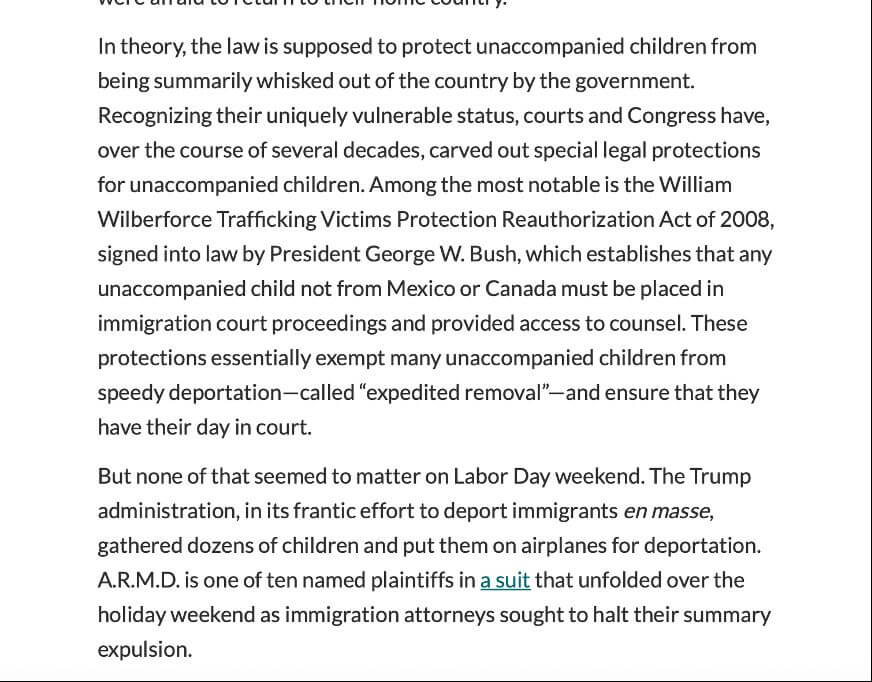
The government basically takes the view that it can ignore the TVPRA. It points to a subsection of the HSA of 2002, which provides that, among other things, the Office of Refugee Resettlement is responsible for “reuniting unaccompanied alien children with a parent abroad in appropriate cases."
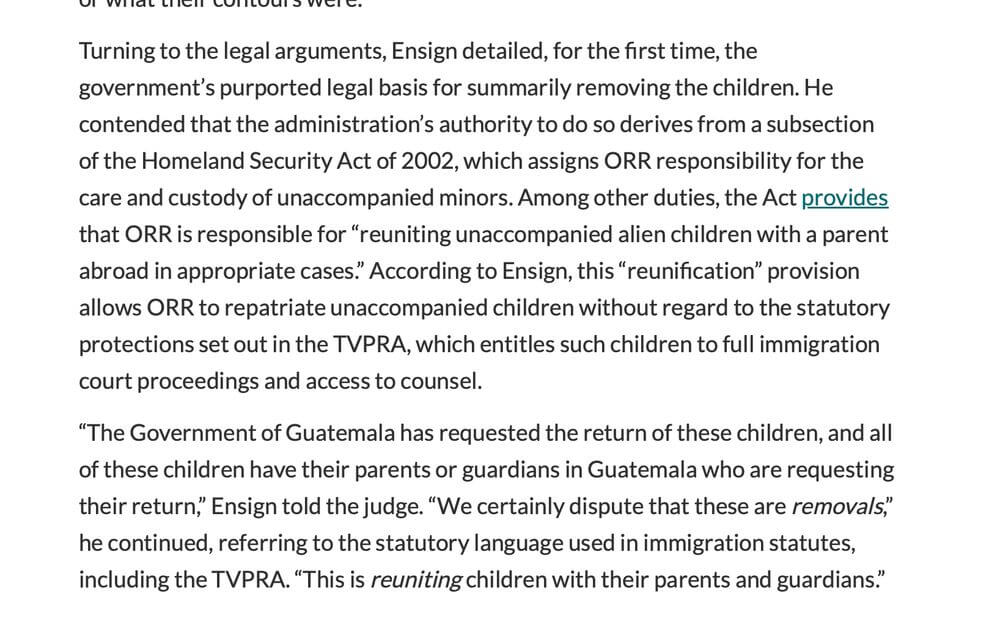
The government says this “reunification” provision allows ORR to "reunite" unaccompanied children with their parents in Guatemala without regard to the statutory protections set out in the TVPRA. Frankly, it's a really insane argument, and its implications are staggering.
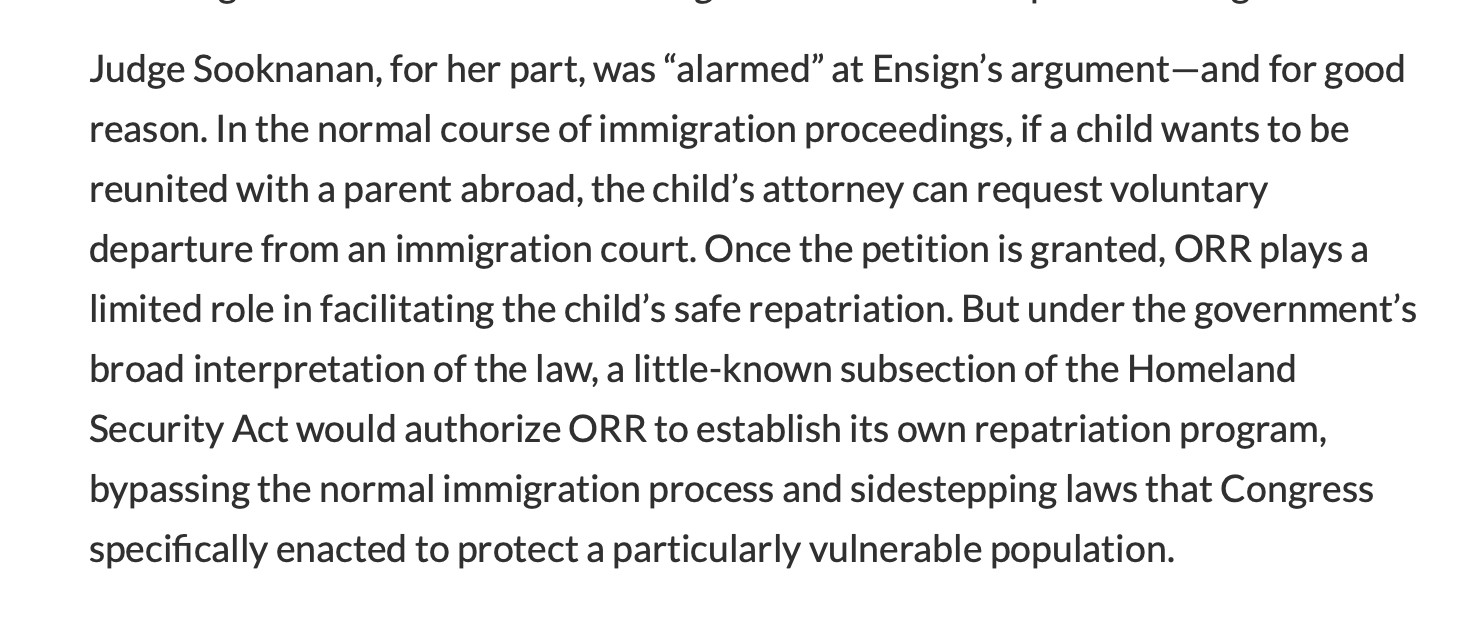
The other thing you need to know is that the government previously told Judge Sooknanan that all of the parents of these children had requested their return to Guatemala. But DOJ has since dropped that claim (because it quickly became clear that it was utterly false).
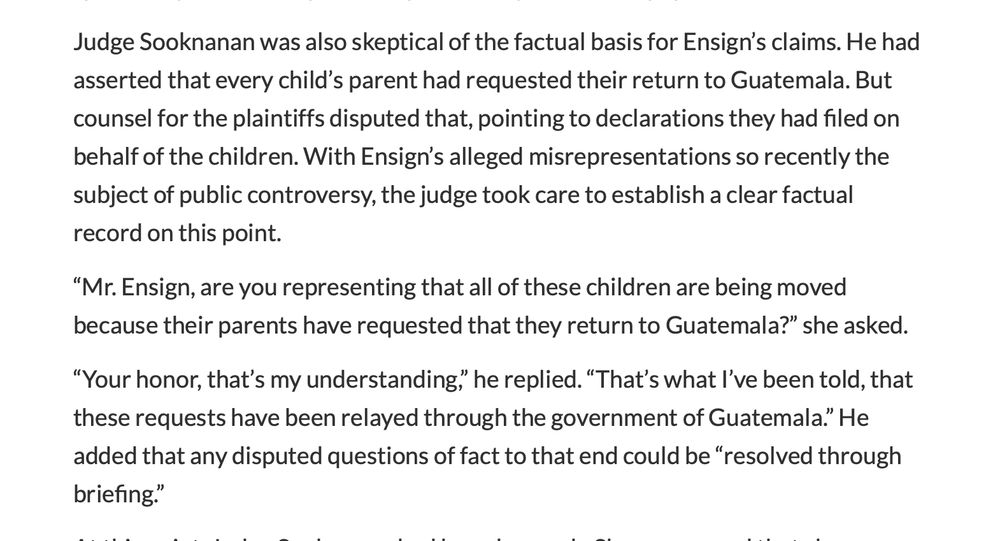
Ok here we go. Judge Kelly is on the bench, and counsel for the children is up first. It's Efren Olivares representing them today. (Audio isn't great so bear with me)
Judge Kelly begins with questions about voluntary departure, which a child can apply for in the course of immigration proceedings.
Judge: You all argue that for voluntary departure an immigration judge must sign off -- do you agree statute doesn't require final order of removal? Olivares argues once child is in immigration proceedings, judge has final word. But Kelly seems to want a statute or reg that says that.
Kelly then says that a lot of the plaintiffs arguments are about things DHS can't do, but it's essentially HHS taking this action (because the "reunification" provision applies to ORR, a division of HHS, which has custody of the children).
Judge Kelly: TVPRA says need to place child in removal proceedings, but that only kicks in if DHS is seeking to remove a child, not some other agency taking action pursuant to some other statute. What's plaintiff response to idea that it's not DHS doing anything here, it's HHS/ORR?
Olivares points to 6 USC 269c, saying that nothing in that section transfers authority to ORR away from immigration judges/other officials who adjudicate immigration benefits under the INA

The discussion turns to imminence and irreparable harm, but the audio starts going in and out......😩 Seems to be back now, however.
Judge is asking about whether he has to find that the plaintiffs should irreparable harm for the entire class. What if they showed for 95%, but not 5% of. the proposed class? Olivares says that's not a bar to the requested relief.
Judge Kelly mentions that the gov claims that they aren't including anyone with a pending asylum claim in the repatriation program. Why should those people be included in class?
Olivares basically says that the government can't be taken at its word. Evidence in record is that there are children who have pending applications...others don't but that's not what the statute requires.
Judge Kelly asks about language for proposed order. What would he include? Olivares says they are requesting that he certify a class of all unaccompanied minors not from countries contiguous with the US (so, not Mexico or Canada)
Olivares also mentions a separate issue the plaintiffs wanted to raise, which is that some of the kids who were woken up in the middle of the night and taken to the airport were in long term foster care but were placed in a shelter when they returned from the airport.
Now Sarah Welch is up for DOJ. Judge Kelly wants to start with questions about "the facts." I was struck by the fact that the government's representations have seemed to "evolve," he says.
To that end, Judge Kelly notes that Drew Ensign told Judge Sooknanan that all of the parents requested the return of the children. He cites a Guatemalan government report, published by Reuters days later, which says that none of the parents requested/wanted their return.
Welch basically says she can't make any representations on that point. The audio is poor, but she says something to the effect that a record hasn't been developed on that point.
Judge asks if he should treat the government's earlier representation as withdrawn. Welch says she can't make representations on that point. Judge Kelly says ok, so I should treat that as withdrawn. Then he asks if the gov's plans have changed based on info that parents didn't request return.
Welch, for DOJ, says the government's plans haven't changed. The government's view is that a parental request for return is not required. This is initiated and requested by the government of Guatemala.
Now Judge Kelly wants to know if the government plans to reassess for the children whose attorneys have now objected to their removal. Welch says the objection would have to be credible fear based or some other disqualifying claim. "Mere" objection of "I don't want to return" not sufficient
Judge Kelly: Government says there were 300-something kids eligible at first, but that has been whittled down. But could that number grow, children be added? Welch says there are children arriving across the border, continuing to enter ORR custody.
Judge Kelly asks about plans for repatriation of kids from other non-contiguous countries (countries that aren't Guatemala). You represented no immediate plans, he says. Does government reserve right to do that in middle of night on weekend, as it did with these kids?
Welch: I think everyone can agree it's unfortunate that the children were frightened and woken up in the middle of the night.
Judge Kelly asks about assurance [from Guatemalan gov] that children won't be trafficked upon return. Do you have anything else you can share about what specifically that assurance was? Welch says she doesn't have more information she can share.
Ok, now we're onto legal arguments. Welch begins to set out the government's view that 6 USC 279 provides ORR with independent statutory authority and that "reunification"/"repatriation" are different from "removal"...then audio cuts out, briefly. https://www.law.cornell.edu/uscode/text/6/279
Kelly summarizes the view: Government takes view that this statute gives government other way to make person leave the country that is not "removal" under the INA/TVPRA. It overrides other immigration statutes...Are there other examples you can point to that do that?
Welch doesn't have any other examples she can point to. But she says it's not surprising that Congress would carve out multiple routes that pay "particular attention to" the need of unaccompanied alien children who are a particularly vulnerable population.
When Kelly asks a version of the same question again, Welch says that though she's not aware of any other statute that does something like this, she's also not aware of any other statute that transfers custody over migrants to a different agency (as 6 USC 279 does for ORR)
Kelly: When has the government relied on this construction of the statute before? I get there is one case about someone being released to a UK embassy, but you're not saying the government thought it was lawful because of this reunification authority? This is 1st time gov has made argument in court?
Welch can't point to a specific example of the government making this argument in court before.
Judge Kelly asks about the fact that the plaintiffs have declarations from a lot of the children who say they don't want to go back. Is it fair to say that I just don't have much to consider [from the government] to the contrary?
Welch: I agree that we don't have declaration in record saying that, but plaintiffs say they do not dispute that some child might want to go back...This makes the class fundamentally unsuitable for mandatory no opt-out class treatment...
Judge Kelly: Let's say I denied the PI. And a whole bunch of plaintiffs were removed. And then the case is litigated and I find they do have a right to removal proceedings. Is the government's representation that those plaintiffs would then be returned?
Welch says that her understanding is that removal is not categorically irreparable harm because a person in general can be returned to the United States.
Judge Kelly: Any affirmative points we did not get to? In response, Welch mentions two cases brought by similarly situated children in Arizona and Chicago. (The proceedings are ongoing in those cases, with a PI hearing scheduled in AZ tomorrow) Then Olivares is back up.
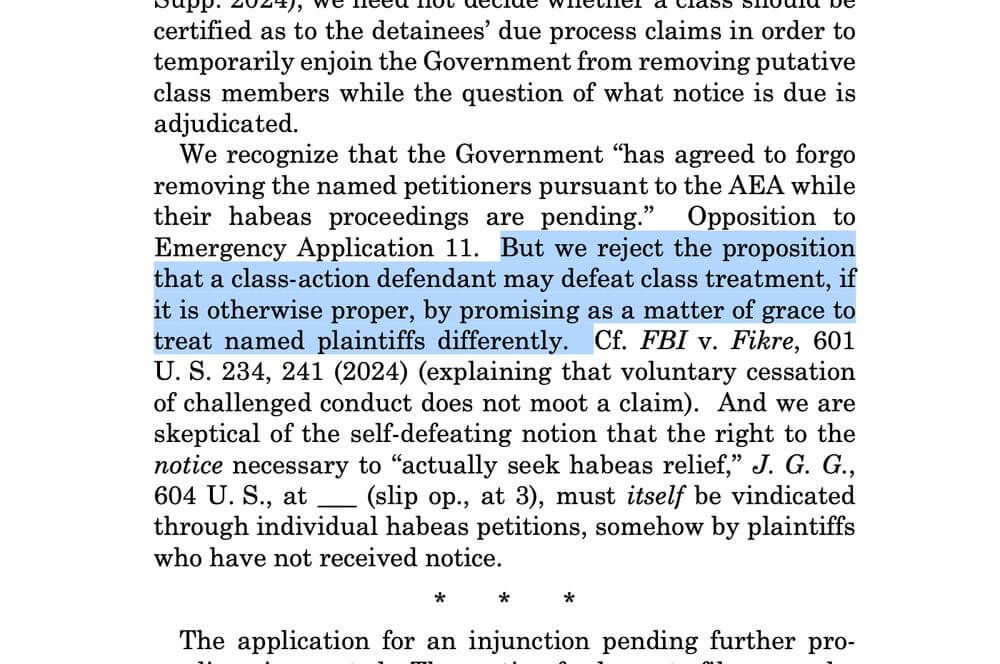
He first mentions a statutory subsection requiring that an order for voluntary departure be issued by an immigration judge. Then he talks about class relief. He says government can't avoid class certification by offering relief to named plaintiffs as a matter of grace. Cites AARP ruling by SCOTUS.
Olivares underscores that the government still has not denied that they might try to remove children from other countries under their "reunification" theory.
Addressing irreparable harm, Olivares points to a recent case that found irreparable harm when the prospect of removal involves risk of irremediable error. And again, he says, we haven't heard representation that this harm could be reversed.
Judge Kelly: What is your response to the government's argument that there are children who don't face harm once they get back to Guatemala and could later be brought back...What's your response that person doesn't face irreparable harm because removal is not irreparable harm?
Olivares says that they don't need to show irreparable harm for every single class member.
Olivares turns things over to Rupa Bhattacharyya, who addresses a few additional legal arguments for class certification.
Judge Kelly summarily concludes, saying that he'll get a decision to the parties as soon as possible. And we're done. Thanks all for following along! If you appreciate our courts coverage, I hope you'll consider supporting @lawfaremedia.org's non-profit newsroom. https://givebutter.com/journalism/annabower1
And read Parloff's report by clicking the button below or view his thread on Twitter here.
Liveblog
At 2pm there will be a preliminary injunction hearing in the Guatemalan children case (LGML v. Noem). I hope to live-blog here for @Lawfare , as will colleague @Anna Bower on another platform. For bracing & thorough background, see Anna's piece here: https://www.lawfaremedia.org/article/the-judicial-learning-curve /1
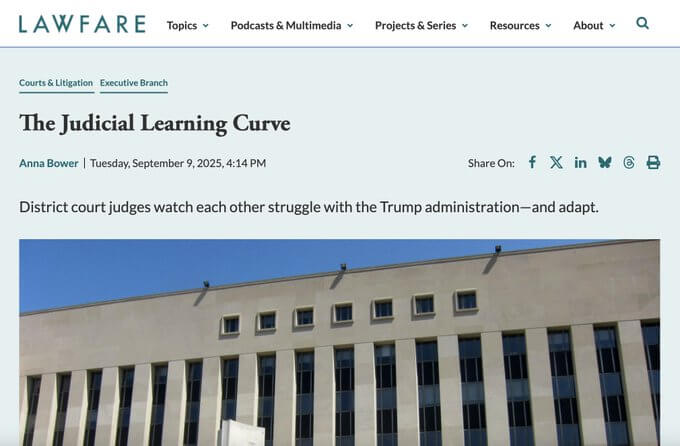
If you recall, Judge Sparkle Sooknanan entered a temporary restraining order 8/31, barring the removals— govt calls them "reunifications"—of Guatemalan children ages 10-17. Govt has admitted intent to deport 327 children, with the first 76 booked for departure at 10:45am ET on 8/31. ... /2
... Judge Sooknanan was just covering the emergency docket that day—it was Sunday Labor Day weekend—so now the case has been randomly assigned to Judge Tim Kelly, who must decide whether to extend the TROs into a preliminary injunction & whether to certify a class. ... /3
... The petitioners claim that the govt's attempted removal of the children violated the Trafficking Victims Protection & Reauthorization Act of 2008 (TVPRA) (8 U.S. Code § 1232), which contemplates extensive protections for unaccompanied alien children (UACs). But ... /4
... the govt argues that an obscure provision (6 USC § 279(b)(1)(H) lets it, in essence, circumvent those rules to "reunify" children with parents or legal guardians. Petitioners say they've seen evidence govt plans to try same thing with Honduran & maybe Salvadoran children. ... /5
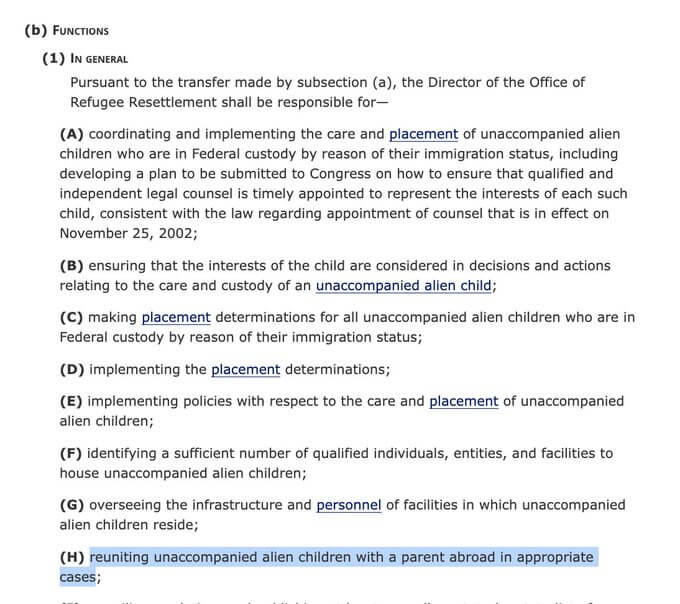
A report of the Guatemalan National Attorney Generals, issued last week, did *not* confirm the US govt's suggestion that Guatemalan parents/guardians were seeking return of their children. None of those surveyed were. ... /6
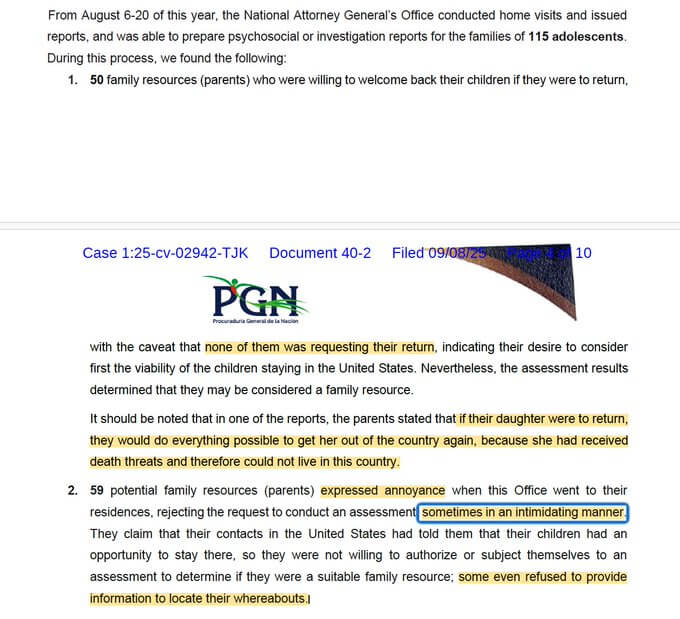
Judge Kelly has taken the bench. /7
[sound is a little soft] Start with plaintiffs lawyer Efrén C. Olivares. Judge: you all argue in papers that for voluntary departure child must either receive an order -- that Immigration judge must sign off -- do you agree statute doesn't require final order of removal? /8
Olivares: we agree , doesn't require ... [sound is soft.] Judge: does judge have to sign off -- is that law, or a reg, or a practice. it doesn't seem to say that. O: once a child is in proceedings, IJ has the final word. /9
Judge: and source of that--just inherent in nature of proceedings? O: yes, inherent in the spirit of INA. J: assuming the child wants to leave US as soon as possible -- just assuming -- and child is in removal proceedings, and child wants to leave ... how long would that take? /10
O: refer to exhibit from former immigration judge ... takes [long time] J: even where child wants to go back? ... OK. Defs say the authority they're exercising is [different]. ... placement in removal proceedings is only when DHS seeks to remove child. not some other agency. so ... /11
... Judge Kelly cont: what do you make of that argument. saying it's not DHS doing something, it's HHS doing something, so it's not covered. that's outside scope of the statute's you sight. O: i'd point to 6 USC 269c ... nothing transfers authority away from [immigration judges] /12

J: govt argues that 8 USC 1252f1 bars me from granting injunctive relief. O: that provision was enacted before the TVPRA. not covered by it. ... J: In order for me to grant preliminary injunction to class do i have to find that each class member would suffer irreparable harm or ... /13

O: we think entire class is at risk. court is empowered to prevent imminent harm J: so your view is that even for minors who are not Guatemalan ... you've made broader request. ... for [noncontiguous] countries ... why is imminence requirement met? O: we've put before court /14
... evidence relating to other countries that tracks the same pattern. we've attempted to get govt [to reassure us they aren't doing that and they won't]. J: your comments suggest plaintiff could make up for imminence by irreparability. not sure that's 100% accurate. ... /15
.. J: you'd have to show some level of imminence here. O: correct. ... in case of Guatemala, imminence was a couple hours. we're trying to avoid another [attempt over the weekend to whisk them out of the country]. J: do you agree you have to show imminent harm for every class member? /16
J: if i found you'd shown irreparable harm for 95% of class, but 5% you hadn't. is that a bar to me? O: that is not. ... inability to show harm to small percentage of class not a bar ... been held in the circuit. recent cases cited in our brief. we've presented dozens of declarations from class members that show sufficient imminence of harm. /17
J: govt says: we disclaim that anybody with an asylum claim is part of our plan , whyh would those people be included? O: sorryt to say, we cannot take defs at their word. ... evidence in record that children who have pending applications ... others have not, but that's not what statute requires. /18
... J: the other example i'll throw out to you ... suppose a plaintiff who says i want to go back to guatemala. a person in that scenario ... tell me why that person ... you have a showing of irreparable harm for that person. O: in that hypo ... depends on age of child. ... /19
O: ... all we're asking is that the process be followed. we're not trying to stop that [in that hypothetical example]. J: and that lack of that procedure is irreparable harm? O: correct. J: So loss of process -- even if child is saying i want to go back -- the loss of those required procedure is irreparable harm in and of itself. /20
O: yes, in the case of that hypothetical child, and we don't have that case before us. J: should have said ... obviously ... any child that you have a declaration for saying if i go back i have risk of being trafficked or abused--goes without saying [there's irreparable harm for him/her]. /21
J: do you have any -- you've given me a proposed order -- but anything else , other language you think is important to prevent irreparable harm for whatever class i [certify] O: requesting no repatriation of any UAC from any country other than Mexico or Canada. [law is different for those countries.] /22
O: some of the children woken up in middle of night and taken to buses and airport ... in longterm foster care. now they've been put in group shelters. we'd ask that be sent back to their longerm foster care homes. ... that's come to light in last few days. /23
J: those are the questions i had. anything else you want to make sure i get? O: my co-counsel can address questions about the class you may have. otherwise that's all. DOJ counsel Sarah Welch: J: first some questions on facts. ... /24
J: i was struck how govt's reps as to subgroup of children who were planned to be sent to guatemala ... struck by gov't's representations with respect to tgheir parents. you told judge sooknanan they all had parents in guatemala waiting for them. i have before me recorrd from guatemala AG how few parents they were even able to locate. None had requested they come back. /25
J: do you all contest what that report lays out? if not, has that altered what govt plans to do? W: i don't have anything ... no to that question. [can't hear her voice; too soft] J: should assume representation made to judge sooknanan was wrong? W: i can't affirmatively represent that. J: does that mean govt's plans have changed? /26
DOJ atty Welch: i'm not aware of any change. our view is that parental request is not required. ... govt of US working with govt of guatemala on this. J: even if not req'd by statute, but it was certainly an important key fact that govt leaned on in arguing to Judge Sooknanan. that this was consensual. more than consensual. parents were asking. /27
J: Ok. put parents aside. now we have some children who you had identified as "eligible" that in the group of 327 ... at least 5 of those as named plaintiffs here who say they dont want to go back. i guess the question is: does that change the govt's plans for these kids? /28
W: it certainly does. ... [too soft for me to here] we've already determined 5 of 10 named plaintiffs not eligible. the remaining 5 now have attys ... so under our criteria, none are eligible. J: because other attys objected? W: the attys in the courtroom. /29
J: does govt plan ... to circle back and see whether other plaintiffs object to going back W: a number of other objections have come in. J: so for anyone for whom a lawyer has objected—that kicks the person out of eligibility? W: [yes] J: do all 327 have attys? W: they didn't as of 8/31. now many more do. /30
J: for that group ... who doesn't have an atty , is the govt planning to initiate some sort of process to see whether the [child?] objects? W: [couldn't hear] J: you're not ruling out that there's some group of folks who do not have a lawyer and govt does not know if child objects ... would child remain "eligible" for [reunification] /31
W: mere objection would not disqualify the child. J: [what about plans for doing this for UACs from other countries] W: my understsanding is govt doesn't have immediate plans for any other country. no immediate actions. J: that 327 number has been whittled down ... is there a possibility of adding to it? W: do think it's possible. children arriving across border now. or [voice too soft] ... /32
Judge: now let's talk about ... what if anything can govt represent about another group of guatemalan children or from other noncontiguous countries -- you said no certain or immediate plans. Does govt reserve right to do that in middle of night on weekend. W: can't think of a reason for doing that. everyone agrees it was unfortunate children were frightened. /33
Judge: if plaintiffs are right and children have to be put into removal proceedings but are eligible for voluntary departure -- tell me about that process. what's required in statute, reg, practice. and how long it takes. ... Welch: i don't have statistics. ... not aware there's a statute that requires judicial approval. /34
Judge: but is that the typical [way the process works]. i mean judge oversees that ... typically signs off in some way. Welch: not sure I can [answer] what the practice is. J: One of the criteria for eligibility was that govt was given assurances by Guatemala that the child wouldn't be trafficked. W: yes. /35
J: do you have any more info about that representation. what the assurance was? W: i don't have more i can share. ... multiple communications with Guatemala thru dept of state. J: the part of the statute that to me gave you all the most [trouble?] is part that describes -- 1232a5C -- talks about repatriation ... hard for me to read that and conclude you could repatriate someone without removing them. W: /36
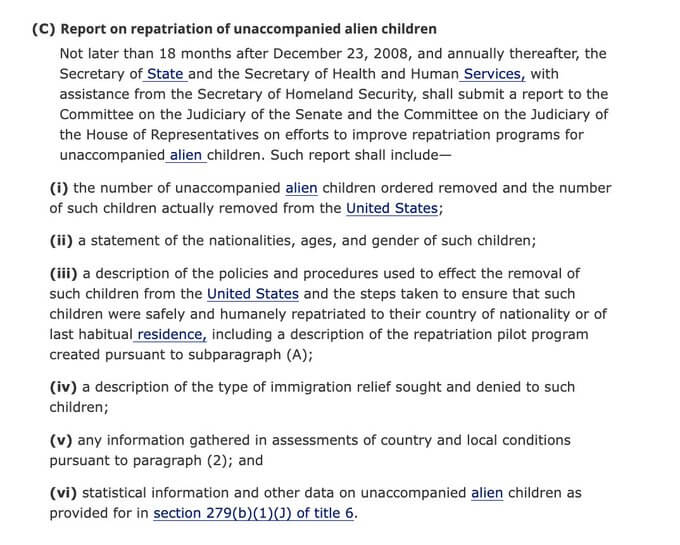
W: [didn't catch her response] J: so under your reading, repatriation and reunification are different concepts, different authorities. W: repatriation in 1232 is broader than reunification [in 6 USC 279] J: so your argument is the authority you lay out creates another way for a person to leave the US that is not removal. ... /37
J: ... so it effectively overrides the INA. (Immigration and Nationality Act) . any other examples of authority you can point to where congress said, okay, we're going to carve out these people and say INA doesn't apply to them? W: first, dont have another example to offer at this point. /38
W: but i dont think it's circumventing the IRA. Congress has set up multiple routes. ... not surprising to see separate ways children could leave the US J: does it seem strange to you that under your reading the procedures that children from noncontinguous countries -- is it govt's view that same reunification authority could be used in case of someone from canada or mexico? W: yes, and it has been. /39
J: okay, but there's no other group you can think of where congress said i'm going to hand authority to an official outside DHS. ... It's another pathway to kick someone out of the country. or have them leave the country. W: the INA is a particular enactment. Transfers functions from DHS to HHS. Body of immigration laws is what court now has before it. /40
W: .. I'm not aware of other aliens that someone other than DHS has authority. J: isn't it fair to think -- construing the words themselves -- it strikes me that removal is a word that suggests exit from the US. but it doesn't say where or how or under what circumstances. /41
J: ... and the word reunification suggests something that occurs after you're removed. after you leave. isn't it natural to think of repatriation and reunification as capturing a separate set of things, something congress adds on and says, OK, we're not going to just drop these people off in middle of ocean or bring them to port of entry and say good luck ... /42
J: ... so they specify some things that happen afterward to make sure they wind up in the right country and right place. why isn't that nature reading of those terms. W: not sure i'd agree that reunification refers to something that occurs after ... in the abstract, removal is suggesting an external force in a way that's different from reunification. /43
W: removal is a word used throughout immigration statutes in way reunification doesn't. separate mechanism that allows children to be returned to parents abroad. J: ... construing a statute court can look to practice. ... /44
J: ... i don't think you can point to cases involving mexico and canada [because law is different for them]. [Now they're discussing an example involving a release to the UK.] J: certainly this is first time -- sunday labor day weekend is first time govt made that argument to a court, right? W: not aware [of another]. /45
J: and the issue of what to do with UACs from noncontiguous countries is not a good one. W: yes ... but numbers have changed in recent years ... spiked to tremendous pressing problem. J: no reason to doubt what you're saying but it gets a little tricky in terms of govt arguing this is longstanding interpretation when canada & mexico examples are [different]. You do have one example but ... /46
J: ... when you have ambassador saying i've got the parents right here .. that's different. waht's gov't's position on (a) whether these children are entitled to notice & opportunity to be heard; and (b) was what govt did over labor day weekend sufficient? W: we do think it was sufficient for due process. ... /47
W: these are children in govt custody. notice goes to caregiver. not to child. ... children do have limited due process rights when they are in govt custody. J: your briefing is replete with references to children wanting to return home. obviously you don't have to prove that. but you offered it up as [going to] the equities. but as of right now i dont think i have any evidence of anyone ... /48
J: ... in the putative class who affirmatively wishes to go back to Guatemala. Is that something ... it drops out of the analysis. you dont have to prove it. but ... W: agree we dont have declaration in record saying that. but plaintiffs say they do not dispute that some child might want to go back ... that makes this class unsuited for [Rule 23] (b)(2) mandatory no-opt-out class treatment.
J: I dont think plaintiffs are asking me to bar any plaintiff from voluntary departure. W: they've told the court that that takes weeks or months. not all classmembers [may want that]. most of these children are in our shelters. ORR's [Office of Refugee Resettlement] job is to pursue the best interests of the child. ... this is case that's fundamentally unsuited for b2 certification. /50
J: i take your point that plaintiffs dont rule out that some of the Guatemalan children -- there might be some child in there who wants to be sent back. can't rule that out. question is, what does that mean for purposes of class certification W: significance: not disagreeing that's an individualized determination for each child. so that's not susceptible to classwide proof. /51
J: for purposes of thinking about a class and irreparable harm, what do you take as import of -- let me back up. you just laid out your view with respect to class certification because of that concession by plaintiffs. let me ask in terms of irreparable harm: is it govt's view ... /52
J: ... that with respect to irreparable harm, fact that every member of class might be facing irreparable harm, that doesn't bar me from certifying class? W: we don't agree. they're requesting several different classes. J: because of imminence? because you've removed some from table? W: right. no irreparable harm if they don't risk leaving the country. /53
J: it's a black box what a particular plaintiff wants and what would happen to them if they go back. might reunite with parents. might be in foster situation. could class capture some who might not be at risk? W: i don't think so. if that child doesn't face risks in Guatemala. if doesn't face any risks of harm in Guatemala and could be returned to US in case of mistake. /54
J: what is govt's view--you brought up returningn to the country. are you representing--let's say i denied preliminary injunction and whole bunch of plaintiffs left the country to Guatemala. and eventually i found that they were entitled to be placed in removal proceedings. is it your position that govt would consent to have them returned? /55
W: my understanding is that removal is not categoricallly understood to be irreparable harm under SCOTUS precedent because person can be returned to u.s. J: that's correct. W: that's precisely why removal is not irreparable harm. person can be returned to US after final judgment. /56
J: do you have, in class context, a case that stands for proposition that every single person who's a member of the class without exception would have to be facing irreparable harm? W: i agree ... everyone needs to be at risk of the challenged action. plaintiffs have conceded that child's best interests is fact-intensive individualized question. /57
J: you're conflating best interest of the child with irreparable harm. one final question: you're telling me no named plaintiff is now at risk from the challenged action, what is the legal import of that W: there is no class rep who can adequately represent that class or whose claims are typical of the class. /58
W: ... none of the class members is eligible for reunification. J: because none of the named plaintiffs are still eligible [for reunification]. Anything else? Welch: i do want to mention 2 other cases. District of Arizona. no request for class certification in that case. PI hearing tomorrow. another in NDIll. 4 plaintiffs. /59
J: plaintiffs counsel, anything you want to add? O: yes a few points. to clarify: request for voluintary departure must be granted by immigration judge. [he cites the statute]. [8 usc 1229c. (?)] also want to be clear: ORR never notified even attys of children who were represented. ORR notified caregivers. /60
as far as class certification, in AARP .. there were only 2 named plaintiffs, and SCOTUS ... said the govt can't avoid class relief by offering individual named plaintiffs relief as matter of grace. Also, we did not hear denial that they may eventually try to take children [from other countries out of the country under the same theories.] /61
O: On the issue of relationship between the 2 statutes here. the TVPRA is much more specific statute. J: it's more specific than which? O: than title 6 USC 279b1h. ... doesn't mean courts can disregard other statutes ... as for example of child from United kIngdom--that child was sent from UK to be reunited with grandmother. no indication [what process was followed] ... /61
J: govt says that supports their position that they were using an authority outside the INA. as far as facts go, i think we're all on same page, though. O: on irreparable harm: WMM v Trump ... when prospect of removal involves risk of irremediable error. J: where? O: 5th circuit court of appeals. /62
O: here 11 children have expressed fear of removal. fear of torture , persecution. J: i hear you on that. what is your response to govt's argument that ... with respect to a particular member of the class that doesn't face harm—fact that that person exists. govt makes argument that if mistake is made they can be brought back. /63
O: a few responses. we do not have to show irrep harm for every single member of class. also, child might be eligible for another form of relief here and might miss out on that if taken to Guatemala. Now his co-counsel will address some questions: Rupa Bhattacharyya: [she cites a precedent she says addresses govt's arguments about class certification] /64
B: second, [i think it's incredibly telling that] in face of incredibly reticulated statute [protecting rights of children] the govt points to a section of a different law of less than a dozen words [in 279b1H]. it's simply not the way the law works. the more specific law always triumphs over the more general. /65
B: third, no req't that every member has to face irreparable harm. ... AARP supports that proposition. whole purpose of having class representatives is to J: govt says you dont have any class reps at moment. the other 5 excluded earlier by their criteria, and now the other 5 are excluded. B: 2 responses ... /66
B: govt's forebearance is not sufficient [to disqualify a class representative (AARP)]. second thing, with respect to procedural due process claim--that's a right against mistaken deprivation. no assurance of protection against that. [Sorry i didn't really get that.] J: alright, i will get back to you all as soon as I can. /67
COURT IS ADJOURNED Thanks for following along. If you find these live-blogs and our other analyses helpful, please consider donating to @Lawfare at https://givebutter.com/journalism/ Thanks! /68-end






